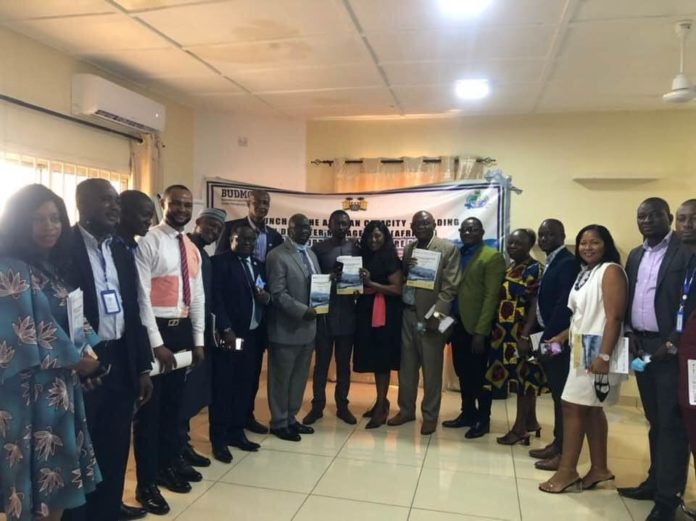By Foday Moriba Conteh
The National Disaster Management Agency (NDMA) in partnership with Bournemouth University Disaster Management Centre (BUDMC), on the 30th September 2021 launched a report on the Single Point Of Failure In Sierra Leone’s Disaster Management at the NDMA Conference Room, at Aberdeen in Freetown.
The objective of the research project is to inform actions and refine the capacities of policymakers and offer solutions that lead to improving disaster management governance.
“Contemporary challenges confronting disaster management officials and stakeholders in Sierra Leone are extensive and almost seem too numerous or frequent to bear; potential solutions lie beyond the reach of the disaster managers,” says Lt Gen (Rtd) Brima Sesay Director-General, NDMA.
The Director-General pointed out that Sierra Leone is affected by disasters including floods, fires, windstorms, collapsed buildings, and a host of risk and vulnerabilities that affect the population. He said disasters over the years have impacted the lives of ordinary people and government development programs. He noted that the challenges identified in the research product will be addressed, especially within the context of the operational realities of the existing capacities of NDMA.
“After the mudslide of 2017, the need to reflect on these challenges in the overall management of national emergencies became evident, ranging from coordination, cooperation, collaboration, communication, data management, emergency response, risk analysis, onto human resource management,” the DG added.
One of the Authors of the report, Professor Lee Miles of the Bournemouth University said, in his 30 years of working in disaster management across the world, he was so impressed with the work done in Sierra Leone, “I have to say that working in Sierra Leone with the pack is one of the most positive and accessible experiences I have ever had,” he noted.
Prof. Lee, the AFRICAB project lead for Driving African Capacity-Building in Disaster Management stated that the African capacity-building project covers three years worth of cumulative work and comparative work in Cameroon and Senegal.
“Sierra Leone is where most of the work was undertaken, and it is a good example of where the ideas of researching on disaster management and looking on disaster management come together, and very much at the mind that to understand and study disaster management means you have to do it”.
The Representative of the UK High Commissioner, Keith Hammond said that the feedbacks from people who have read the report suggest it is explicitly impressive. “I think it’s probably true to say that everything that I have seen indicates that there have been improvements in the structures on responding to disasters, both at the national level,” he maintained.
The representative from the Office of the President, Dr Brima Kapuwa said it was a breakthrough to launch the research product on single points of failure conducted by the Disaster Management Unit of Bournemouth University. “This engagement underscores the importance of research and science in our overall human development,” he said.
The Disaster Management Unit of Bournemouth University has long held excellent expertise in disaster risk management, spawning valuable tools like early warning systems and satellite mapping services, disaster risk studies and global risk models.
“The research document on a single point of failure intends to help us prepare for disasters and postulate solutions in dealing with them.”
He noted that making good of these opportunities, scientists need quality, comprehensive data and information gathered after a disaster to develop the methodologies and tools.
The authors of this research document recommended the development of a mechanism that addresses challenges or drivers of failure at all phases of disaster management.
The product recommends education and training to raise awareness and build the capacity of individuals and communities to contribute to these efforts.
The findings of this work will be at the center of knowledge sharing engagement by exploring the lessons learned from past disasters. The overall essence is to ensure the development of policies for effective risk governance.
The AFRICAB final report offers recommendations for future actions focusing on addressing technical, procedural, coordination, communication, human, physical, economic and capacity-building areas of Single Points of Failure.
Each of these recommendations also includes specific and immediate action points for policymakers and stakeholders in Sierra Leone. The report will help in strengthening the disaster management system in the country. Dr Kapuwa assured the leadership of the research team of BUDMC that government, through the Agency, will handle the findings therein the report with due diligence and heed to its applicability.
Dr. Kapuwa implored the continued cooperation of all partners, including the international community and NGOs, to assist NDMA and BUDMC in navigating around these single points of failure in addressing the disaster risks of the country.
The John V. Rogers, the Deputy Director-General of the National Disaster Management Agency and the Chairperson of the program said the Agency was pleased to be part of this strategic partnership with BUDMC. He said the looming disaster risks, if not resolved, are likely to lead to more adversities and thus require urgent attention and action, especially where preventative solutions are within everyday reach of the population.




